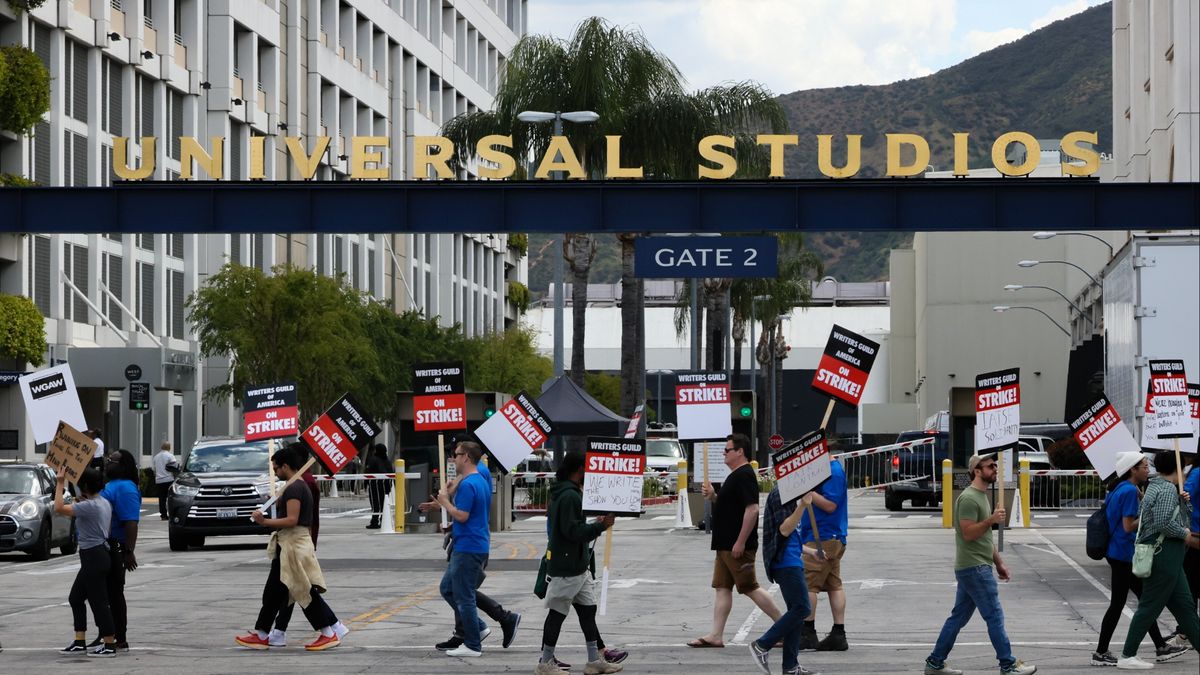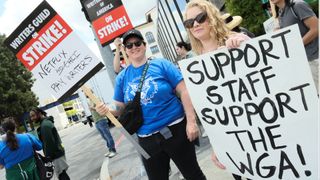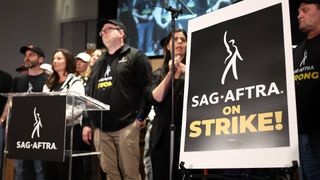The writers' strike is over! Everything you need to know about the WGA agreement
After 148 days, a deal has been made

After 148 days (i.e. nearly five months) of strike action, the WGA has finally struck a deal with the Alliance of Motion Picture and Television Producers (AMPTP). The actors' union, SAG-AFTRA, is still on strike, so the movie and TV industries won't be getting back to normal just yet, but they're certainly heading that way.
So, what exactly does this new agreement mean, and how will it affect the industry and audiences going forward? We've put together the guide below to give you the lowdown on what's going on and answer all your biggest questions, from why the WGA was striking in the first place to when the strike officially came to an end.
Why was the WGA striking?

The Writers Guild of America (WGA) started their latest strike on May 2, 2023, their first industrial action since 2007. The union failed to negotiate a new contract with the Alliance of Motion Picture and Television Producers (AMPTP), which represents Hollywood studios, after their previous deal expired on May 1.
The main reason for the strike was unsatisfactory pay – median screenwriter pay hasn't risen since 2018 and, if we're accounting for inflation, it's actually fallen by 14%, while median weekly pay for writer-producers has declined by 23% over the last decade when adjusting for inflation. WGA members also had demands for regulations for the "use of material produced using artificial intelligence or similar technologies."
What agreement has been reached?

Negotiations between the WGA and the AMPTP restarted on September 20, with Hollywood studios represented by four executives: Disney’s Bob Iger, NBCUniversal’s Donna Langley, Netflix’s Ted Sarandos and Warner Bros. Discovery's David Zaslav. A new, three-year contract was tentatively agreed upon during these negotiations, with the union announcing the news to its members on September 24. On September 26, WGA voted unanimously to end the strike.
The WGA released the 94-page contract agreement along with a summary of the newly agreed-upon terms and conditions. Per the official contract, the terms include:
- Weekly Pay Increases: The minimum weekly rates for staff writers and Article 14 writers (story editors/executive story editors) will increase by the overall minimum increases (5%-4%-3.5%). The increases for staff writers go into effect immediately; and those for story editors/executive story editors go into effect the Sunday after ratific
- Increased foreign streaming residuals: Foreign streaming residuals will now be based on the streaming service’s number of foreign subscribers for services available globally, amounting to a 76% increase (including a 2.5% base increase) to the foreign residual for the services with the largest global subscriber bases over 3 years. For instance, Netflix’s 3-year foreign residual will increase from the current $18,684 for a one-hour episode to $32,830.
- Viewership-based streaming bonus: The Guild negotiated a new residual based on viewership. Made-for HBSVOD series and films that are viewed by 20% or more of the service’s domestic subscribers in the first 90 days of release, or in the first 90 days in any subsequent exhibition year, get a bonus equal to 50% of the fixed domestic and foreign residual, with views calculated as hours streamed domestically of the season or film divided by runtime. For instance, projects written under the new MBA on the largest streaming services would receive a bonus of $9,031 for a half-hour episode, $16,415 for a one-hour episode, or $40,500 for a streaming feature over $30 million in budget. This bonus structure will take effect for projects released on or after January 1, 2024.
- Streaming Data Transparency: The Companies agree to provide the Guild, subject to a confidentiality agreement, the total number of hours streamed, both domestically and internationally, of self-produced high budget streaming programs (e.g., a Netflix original series). The Guild may share information with the membership in aggregated form.
- Artificial Intelligence: AI can’t write or rewrite literary material, and AI-generated material will not be considered source material under the MBA, meaning that AI-generated material can’t be used to undermine a writer’s credit or separated rights.
- A writer can choose to use AI when performing writing services, if the company consents and provided that the writer follows applicable company policies, but the company can’t require the writer to use AI software (e.g., ChatGPT) when performing writing services.
- The Company must disclose to the writer if any materials given to the writer have been generated by AI or incorporate AI-generated material.
- The WGA reserves the right to assert that exploitation of writers’ material to train AI is prohibited by MBA or other law.
When will the writers' strike officially end?

Both WGA West and WGA East leadership voted unanimously on Tuesday, September 26 to end the strike as of 12:01 AM PST the following day.
Sign up for the Total Film Newsletter
Bringing all the latest movie news, features, and reviews to your inbox
The ratification vote will be held from Oct. 2 to Oct. 9. Writers can now go back to work, even before the final ratification vote.
What does it mean for Hollywood?

Now that the strike has officially come to an end, writers' rooms can reopen, and preparation is already underway for work to begin again. Dramas like Yellowjackets and Stranger Things, whose writers' room have been closed since May, can restart, and talk shows like The Tonight Show Starring Jimmy Fallon can begin airing again. While actors continue to strike, however, production on most movies and TV shows still can't kick off in earnest.
What does it mean for audiences?

While work on your favorite movies and shows will be able to resume soon, it's still going to take a while for things to get back to normal in Hollywood after a five-month break. Shows like Wednesday season 2, Severance season 2, and Abbott Elementary season 3 will likely still see significant delays before they reach our screens.
Will the WGA agreement affect the SAG-AFTRA actors' strike?

WGA and SAG-AFTRA are separate unions, so their strikes are not officially linked. However, there is some overlap between the two unions on their concerns, considering both groups are part of the same industry. If the WGA has reached an agreement with the AMPTP, then, it seems promising that SAG-AFTRA may soon get an equally satisfying deal with the studios.
While we wait for more news on the WGA strikes, check out our guide to all the best Netflix shows and the best shows on Disney Plus.
I’m an Entertainment Writer here at 12DOVE, covering everything film and TV-related across the Total Film and SFX sections. I help bring you all the latest news and also the occasional feature too. I’ve previously written for publications like HuffPost and i-D after getting my NCTJ Diploma in Multimedia Journalism.
- Lauren MiliciSenior Writer, Tv & Film
Most Popular




